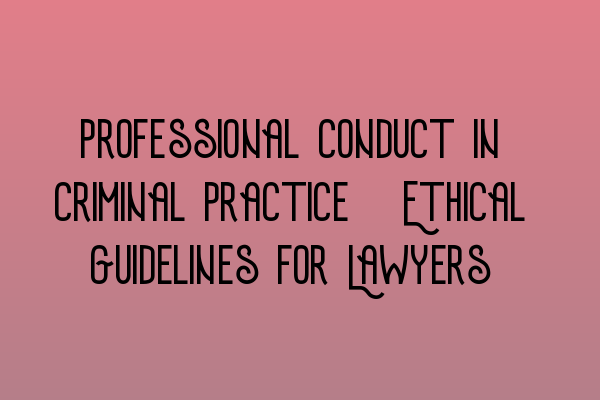Professional Conduct in Criminal Practice: Ethical Guidelines for Lawyers
As lawyers, our professional conduct is of utmost importance in maintaining the integrity of the legal system and ensuring justice for all. In the field of criminal practice, ethical guidelines serve as the foundation for our work, guiding us in our interactions with clients, colleagues, and the court. Understanding and adhering to these ethical guidelines is essential for any lawyer in the criminal practice.
Confidentiality and Attorney-Client Privilege
A cornerstone of our ethical obligations as criminal lawyers is maintaining client confidentiality and upholding attorney-client privilege. We must ensure that all information shared by our clients remains confidential, unless required by law or with client consent. This privilege fosters trust and allows for open communication between lawyer and client, enabling us to provide the best possible representation. It is vital that we explain this privilege to our clients and ensure they understand its implications.
For more information on the importance of confidentiality, click here.
Conflict of Interest
Avoiding conflicts of interest is another crucial aspect of professional conduct in criminal practice. We must diligently assess conflicts at the outset of any case and take appropriate measures to avoid them. Conflicts can compromise our duty to provide effective representation and erode public trust in the legal profession. By identifying and resolving conflicts, we safeguard the integrity of our work and ensure that our clients receive unbiased counsel and representation.
To test your knowledge on conflicts of interest, take the SQE 1 Practice Mocks FLK1 FLK2.
Honesty and Integrity
Honesty and integrity are fundamental to the practice of law. We must be truthful in our dealings, both with clients and the court, and never intentionally mislead or deceive anyone. Upholding the highest ethical standards instills confidence in our clients and fosters trust in the justice system. Our reputation as lawyers relies on our commitment to honesty and integrity in all aspects of our practice.
Continuing Professional Development
As legal professionals, we have a duty to continually update our knowledge and skills to serve our clients effectively. Engaging in ongoing professional development allows us to stay abreast of changes in the law and enhances our ability to provide exceptional representation. By attending relevant seminars, conferences, and workshops, and participating in industry organizations, we demonstrate our commitment to professional growth and maintaining the highest standards in our practice.
For SQE 2 preparation courses, visit here.
Compliance with Legal Rules and Regulations
As criminal lawyers, we are bound by the SRA Code of Conduct, which sets out the rules and regulations governing our professional conduct. It is essential to familiarize ourselves with these guidelines and ensure compliance in all aspects of our practice. By adhering to the rules, we uphold the integrity of the legal profession and demonstrate our commitment to the fair administration of justice.
Conclusion
Professional conduct in criminal practice is built on ethical guidelines that promote integrity, trust, and fairness. By maintaining client confidentiality, avoiding conflicts of interest, upholding honesty and integrity, engaging in continuing professional development, and complying with legal rules and regulations, we contribute to the effective functioning of the legal system and uphold the ideals of justice.
For SQE 1 preparation courses and information on exam dates, visit here.
Let us strive to be exemplars of professionalism in our criminal practice and inspire confidence in our clients and the wider community.
